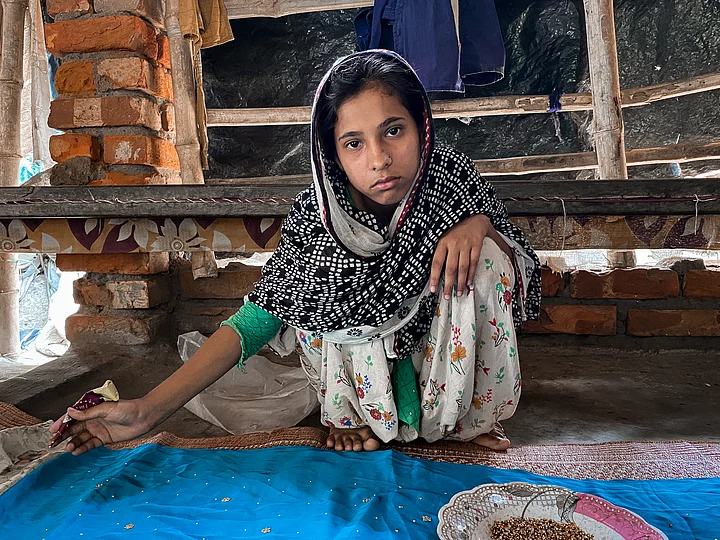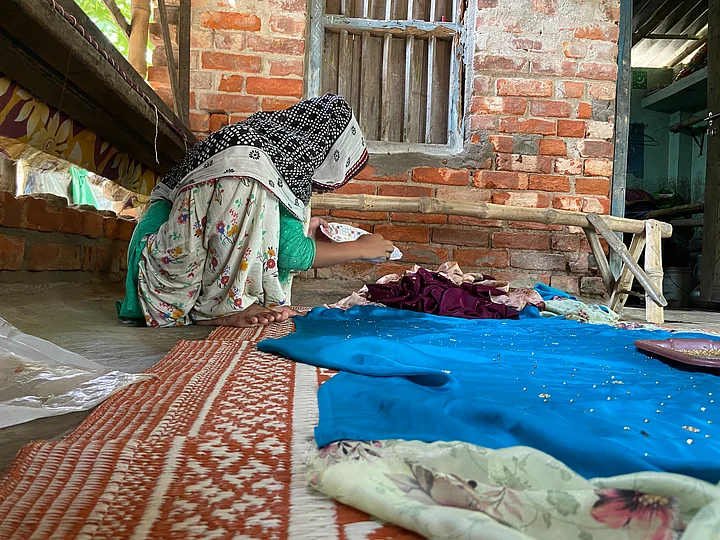Senior Editor: Shelly Walia
Copy Editor: Tejas Harad
(In our new video series, 'लड़की हूं... पढ़ना चाहती हूं – India's Girls Out of School,' we are bringing you stories of girls from across the country who were forced to discontinue education and pushed into early marriages or work. From Madanpur Khadar in Delhi, we plan to go to Govandi in Maharashtra, Bulandshahr in UP, and more such places. Support us to help us complete this series, so that one of the most ignored stories of the pandemic can be told.)
“I wished that the day never ended and that I could stay in school and study further,” reminisces 14-year-old Hadisha Khatun about her last day at school, as she takes her place behind a four-legged wooden frame, with her raw materials, ready to start weaving for the day.
The lanes of this small village in West Bengal’s Mohapur, are lined with such tapestry frames, with colourful sarees stretched out in front of them. And behind most of them, sit young girls who could have been in school instead.
Most of them had to take up work to sustain their families when the pandemic struck. Such was the case with Hadisha, whose father lost his job when the first lockdown was implemented. She dropped out of class 8 and never took admission into senior school.
This meant that she had to step in. Overnight, her life changed completely. From spending her day with books and pencils, Hadisha started spending most of her day with her needle.
"I weave in the morning. I come back in the afternoon for lunch and rest a bit, then I go back to work again in the evening. After that, I meet my friends for a little while. Then, at night, I have my dinner and go to sleep."Hadisha Khatun
- 01/02
Nargisa was a little irritated while speaking to us because she would rather spend whatever time she has, working
(Photo: Debayan Dutta/ The Quint)

- 02/02
Nargisa was a little irritated while speaking to us because she would rather spend whatever time she has, working
(Photo: Debayan Dutta/ The Quint)
‘If I Have Dreams, I Will Be Disappointed’
A few hundred metres away, 16-year-old Nargisa sits on the floor with a bright blue saree stretched in front of her. Her needle, sequence packets, and glue are strewn across the almost-ready saree.
But unlike Hadisha, she did not stop going to school. While she is still enrolled in class 9, she rarely goes to school. The only times she studies is when her friends lend her their books.
As she meticulously glues on sequences to the saree, she acknowledges that her own dreams are broken. She says, “I do not have dreams… If I have dreams I will be disappointed.”
Ever since her father’s untimely death, the odds have been stacked up against her. Her mother cannot sustain the household as she burnt her hand in an accident. And Nargisa is the eldest among her sisters. Two of the five sisters work in order to run the household.
There is a loophole that allows Nargisa and her sister to work, without it being illegal. In 2016, the Rajya Sabha passed an amendment to the Child Labour (Prohibition and Regulation) Act, allowing children to work in family-run enterprises if they can continue their education on the side.
Further, the amendment cut down on the number of industries that are considered hazardous for children. Zari work was among the professions to be dropped off that list.
‘I Worked in Zari Industry, Then Moved to Domestic Help’
Swastika Doloi’s life is marred by a similar thread of unfortunate circumstances. Her mother abandoned the family three years ago, and her father, who is an alcoholic often fails to provide for their family. The 14-year-old dropped out of school when she was in class 5.
While her brothers have been adopted by relatives and are about to finish school, Swastika has to fend for herself and her younger sister.
"I left the embroidery work because there’s not enough money in it. The rate of one saree is around Rs 80, what will I do with that little money? That’s why I took up work as domestic help."Swastika Doloi
‘Still Miss School, Wish We Could Go Back’
A common thread that ties the three stories is that each of them misses going to school. For Hadisha, it is the gossiping and talking to friends that she misses the most while Swastika gleefully reminisces how she used to play during school hours and occasionally bunk classes too.
Both Hadisha and Swastika had similar dreams; to become a teacher. Swastika chuckles; “I want to become a teacher, not a doctor. Blood makes me feel uneasy.” Hadisha, on the other hands, wants to be like her favourite teacher from school.
The nostalgia comes rushing back whenever the word ‘school’ is uttered. Swastika says;
"When school would shut down for holidays, then everyone would be happy. But true happiness would lie in what used to happen during school. That’s what I feel sad about."Swastika Doloi

